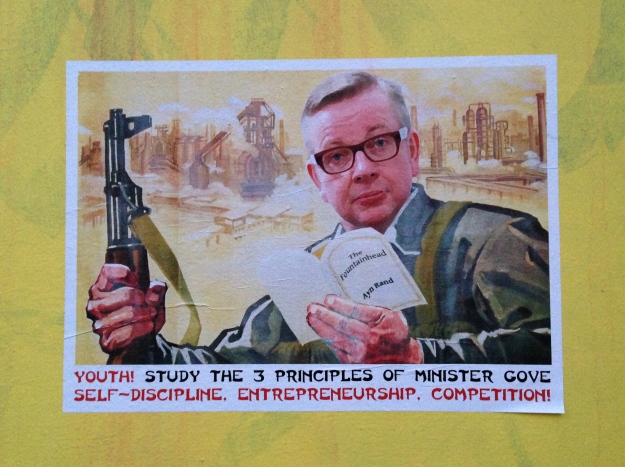 Sussex students flying flags as they occupy Bramber House last Feburary. This post was first published on New Left Project.
Sussex students flying flags as they occupy Bramber House last Feburary. This post was first published on New Left Project.
Of all the lines in George Osborne’s autumn statement speech this week, the idea that UK higher education is on a ‘secure footing’ ranked high on a scale of taking the bloody piss.
This was days after the second strike from higher education workers this term. It also followed revelations last month about BIS budget mismanagement. Further, the strike was accompanied by wave of student activism which has roots in the 2010 occupations and protests but, students graduating as they do, is in many ways a very new wave of activism; one that has been building steadily across the country since the start of the calendar year, when students at University of Sussex occupied a central building in against privatisation.
These protests escalated further on the day of Osborne’s autumn statement itself. Heavy police presence which has increasingly become a norm on campuses further grew to accusations of police assaulting protestors. As has become a familiar pattern the last few years, police have been called in to control students and this has only escalated tensions.
Update: and now the University of London is trying to ban protests. Further update: Looks like the so-called Sussex Five have had their suspensions lifted (though disciplinary action continues) and Andy McGettigan’s found a hole in Osborne’s figures.
Perhaps the most haunting image was a picture of a pool of students’ blood outside Euston Square, shared on Twitter that evening (and confirmed to me by eyewitnesses later).
Is this really what secure looks like? Tip-toeing over pools of students’ blood to get the tube home? That’s ‘secure’ now?
Securities can take many hues though. What is secure, how, where, why and serving whom? The particular security Osborne seems to mean is economic, not whether students are rioting. But that security is still dubious. Even putting aside the BIS budget issue last month, as Chris Cook argues, be wary of promises to fund anything based on selling off the student loan book, as it is worth more to the government than private investors. And policies aiming for such ‘economic security’ are linked to the students protests, anyway. These protesters have quite a complex set of complaints, encompassing a range of contemporary economic and social issues, drawn from within and outside higher education. They are looking at the working conditions of a range staff on campus as well as they ways in which various economic interests are controlling their curricula, their careers advice and the research which is conducted on campus.
A trope of much of the backlash against government HE policy has been the idea that students are being treated as customer and this reflects an insidious marketisation of education. Although I have some sympathy with this critique, I think it’s a lot worse than that. They’re not customers. They’re financial assets.
That’s what first forming, and then selling off the student loan book does. It makes the students – and their postgraduate paycheques – something to invest in. It engrains both formally and informally an idea that education is about fuelling a very particular view of the economy, as opposed to the multiple other things a university could be about (including a chance to question how we choose to pattern our economy, and who gets to control it).
Repeating the complaint that the government is turning students into customers only plays into those who know the idea alludes to a promise of greater student agency (forgetting the rather curtailed extent of any customer agency, or if it’s applicable to education, it implies power nonetheless). And none of this is about student agency, it’s entirely about student use. As a friend said to me recently in the different context of the disproportionate amount of landlords’ power: It’s farming people. I’d almost settle for my students as customers at this stage, the idea of them as simple meat for the economy is so much more sinister.
I fear we’ll see many more pools of blood on the streets around universities before we reach any idea of ‘security’. I only hope there isn’t much blood, and any sense of security we conclude with is lead by and serves students, rather than seeks to exploit and control them.






